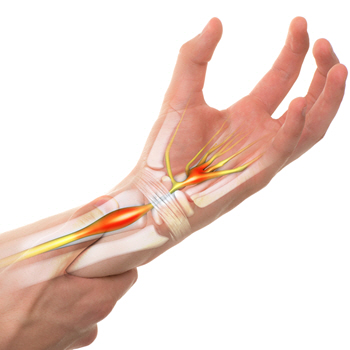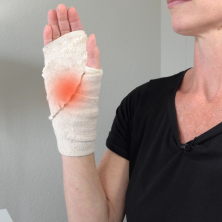You haven’t had a good night sleep in months or maybe even years! You wake up in the middle of the night with a pins and needles feeling in your fingertips. During the day, you find yourself dropping objects out of your hand, fumbling with small items, or have the need to shake your hand to get the feeling back. What you are experiencing could be Carpal Tunnel Syndrome (CTS).
 What Is Carpal Tunnel Syndrome?
What Is Carpal Tunnel Syndrome?
According to the National Institute of Neurological Disorders and Stroke (NINDS), Carpal Tunnel Syndrome occurs when the median nerve, which runs from the forearm into the palm of the hand, becomes compressed (or squeezed) at the wrist.
The carpal tunnel, a narrow passageway of ligament and bones at the base of the hand, houses the median nerve and 9 tendons.
The median nerve provides sensation to the palm side of the thumb, index, middle, and half of the ring fingers; NOT the little finger. It also provides motor function to the small muscles of the thumb and hand. In other words, the nerve fires signals to those muscles to make them move.
Sometimes, inflammation and swelling from irritated tendons that pass through the tunnel, can cause the median nerve to become compressed. If this happens, you may experience pain, weakness, or numbness in the fingers, palm, and wrist. When the nerve is blocked, or compressed, long enough eventually the nerve cannot send signals to the muscles in the hand.
 This can lead to irreversible atrophy, or loss of muscle.
This can lead to irreversible atrophy, or loss of muscle.
Although painful sensations may indicate other conditions, CTS is the most common and widely known of the entrapment neuropathies in which the body’s peripheral nerves are compressed or traumatized.
FACT: Women are three times more likely than men to develop Carpal Tunnel Symptoms.
What are Carpal Tunnel Symptoms?
- Numbness and tingling (pins and needles) of your thumb, index, middle, and half of your ring finger.
- Numbness and tingling or hand pain waking you up at night.
- Dull, sharp or shooting pains into the hand or up the arm.
- Dropping objects frequently or fumbling while retrieving items out of site (such as items in purse or pocket).
- Losing strength in your hand especially with pinching tasks (i.e., opening a bag of cereal).
Is numbness and tingling keeping you up at night? Try this comfortable splint available in our store.
Can the Median nerve be compressed somewhere else?

The second most common area of compression is in the mid forearm, palm side, where the median nerve travels through the pronator teres muscle.
This is known as Lacertus Syndrome, which is commonly misdiagnosed as CTS.
The difference is a loss of pinch strength, fine motor skills, and clumsiness along with burning and numbness similar to carpal tunnel syndrome. A healthcare professional such as a doctor, occupational therapist, or physical therapist can differentiate your nerve compression location.
Ask yourself these important questions:
- Do I have numbness and tingling of my thumb, index, middle, and half of my ring finger (the half closest to your middle finger)? Does my pinky finger feel normal?
- Do I have numbness/tingling/pain in my palm and/or fingers that is worse at night?
- Has the numbness/ tingling caused me to drop items or feel more clumsy than usual?
- Is the strength in my hand or hands decreasing? Am I losing fine motor coordination and pinch strength?
- Do I have muscle atrophy in my hand… in other words, does the thumb muscle look smaller than that on my other hand?
If you have answered YES to any of these questions, you should see a healthcare professional for further assessment. Your physician may send you for a nerve conduction test to determine if you have CTS.
You are not alone. According to the Bureau of Labor Statistics and the Occupational Safety & Health Administration, carpal tunnel syndrome cases number around 900,000 each year.

Let’s get on a video chat together. We’ll help you find relief for your numbness and tingling.
Call to learn how
Is numbness and tingling keeping you up at night?
Try this comfortable splint available in my store.
If you have found this article helpful, do us a favor and share on our social media channels!


 What Is Carpal Tunnel Syndrome?
What Is Carpal Tunnel Syndrome? This can lead to irreversible atrophy, or loss of muscle.
This can lead to irreversible atrophy, or loss of muscle.



